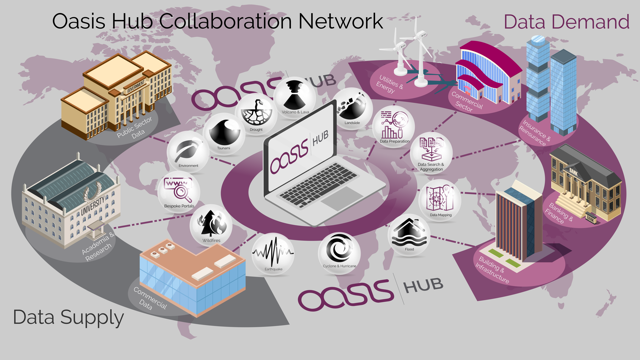
Why UK banks, financial services & insurance require verified, climate-change and natural catastrophe data
Why Oasis Hub exists
Oasis Hub was created to provide an online data-platform and conduit for a range of climate change and natural catastrophe data-sets, analytical tools and services. Data can be downloaded for free or commercially licensed by our membership. We also provide a range of value added services including data & tool aggregation, GIS services and consultancy. Whether it is a strategic climate-change assessment, financial impact assessment or risk management decision, Oasis Hub offers opportunities to better quantify the impacts of climate change and natural hazards.
Initiatives affecting the need for climate and hazard-based data
According to the IPCC, future climate modelled predictions point towards a warmer world, which makes for larger, more damaging climate-change related disasters. Paul Nunn, Senior Advisor at SCOR P&C, stated that ‘disclosures around climate risk are essential. Insurance typically looks at risk today and the impact in terms of costs now. In 2050 or 2100 however, the question arises: what will the effects, costs and impacts be by then?’
The increase in climate risk has led to a growing demand for high resolution flood data,driven by changing land use, plus regional impacts of climate change. Likewise, there is also an increase in the frequency and intensity of storms across the world. Oasis Hub’s data can help to assess the risks.
Oasis Hub’s range of data for modelling and risk assessment could enable insurers, risk managers and underwriters to access, analyse, refine and validate climate-data models for underwriting policies based on future risk profiles. In turn, these can help build climate-change resilience into business models and, ultimately, improve profitability through effective risk management.
Bank of England requirements
The Bank of England (BoE) outlined their expectations in a supervisory statement in April 2019, for UK banks and insurers to develop and embed climate risk management practices, including undertaking scenario analysis. The intent is for participating firms to explore financial risks posed to the wider economy by climate change.
These will include:
- A stress testing framework that will be used to explore less well-understood climate-change risks in several areas.
- Financial risks posed by the effects of climate change can presently be categorised into physical risks and transition risks.
The BoE’s stress test components however will involve non-traditional stress tests across several areas. These will include:
multiple climate-change scenarios i.e. testing the resilience of financial firms that embody risks of policy actions.
insights on any potential spill overs (within UK’s) financial system
an extended (30 year) modelling horizon (and policies to mitigate any tractable climate-change scenario’s).
integrated climate and micro financial variables and
counterparty-level modelling expectations (that will assess the vulnerability of business models to underlying climate-related risks in each scenario).
Task-Force on Climate-relate Financial Disclosure (TCFD)
The TCFD aims to collaboratively achieve a framework of constructive, consistent and coherent principles, guidelines and benefits for companies wishing to disclose their climate-related risks. Fighting climate-change and moving towards a lower carbonised economy by disclosing the preparedness of financial firms in tackling climate change risks is one objective. The release of wider disclosed information and recommendations based on the material impact of climate-change on (their) businesses, is another. By providing data and information that can be sourced directly from Oasis Hub, investors and stakeholders they can make better informed, qualitative, climate-related decisions (for companies disclosing their climate-based risks) will allow for increased transparency and improve or mitigate uncertainty from climate-change risk decisions.
The opportunities available from using Oasis Hub
A benefit of subscribing to the wide-array of climate-extreme data and tools from Oasis Hub is that it affords insurers, financial services & banks, consultancies and risk modelling practitioners the spatial analysis that can improve risk assessment, performance, innovation and materials. These can be exploited in tackling the growing challenge of integrating climate data into risk frameworks.
Oasis Hub’s platform also presents business opportunities revolving round risk management, adaptation, resilience, resource efficiencies, products and services, creation of and access to new climate-led technologies and efforts to mitigate climate-related risk exposures.
Exposure, in this context, refers to an organisation’s vulnerability to negative (financial) impacts or conversely, the capability of realising positive impacts from the transition to either a lower-carbon economy and/or the physical aspects of climate change.
Summary
The complexity and uncertainty associated with climate extremes and environmental changes make it difficult to identify specific touchpoints and time frames in which climate change may affect organisations or even an economy. Therefore, as a recommended starting point, organisations should begin to assess their value chains over a reasonable time frame as it relates to:
climate-related risks and their financial impacts including their physical risks such as the effect on lending portfolios, disruption of operations or destruction of property and
climate-related opportunities such as access to new markets and new technology (e.g. adaptation and resilience, carbon capture and water storage technology).
Utilising Oasis Hub as a central portal enables simplified access to validated, scientific, environmental hazard and extreme climate-related data, tools and services. These services will help accelerate both qualitative and quantitative analysis to climate-based vulnerabilities and also help build resilience to these. Equally, Oasis Hub’s collaborative network has the ability to assist model lesser modelled risks in accordance with a company’s requirements.
Firms can adopt Oasis Hub’s data, specialist tools, modelling and services and climate-assessment technology from a wide-range of verified data providers and scientific sources. Accordingly, these services can be bought to comply, assess and model exploratory scenarios, stress testing requirements and financial disclosures that, for example, conforms with the BoE’s stress-test regulations and exploratory scenarios but also help better refine risk and impact assessments.
Want to learn more? Email us hello@OasisHub.co to arrange a discovery call.
